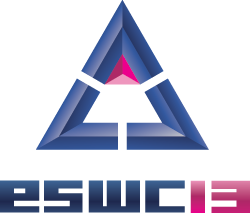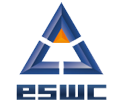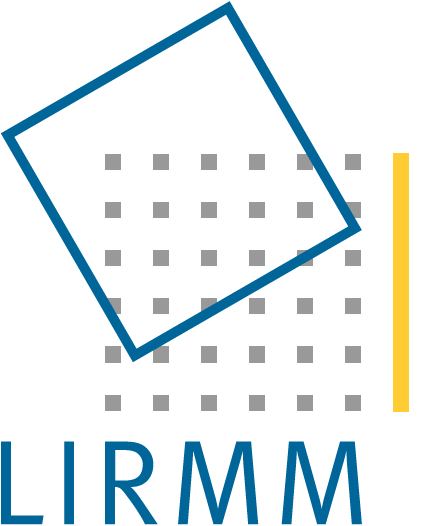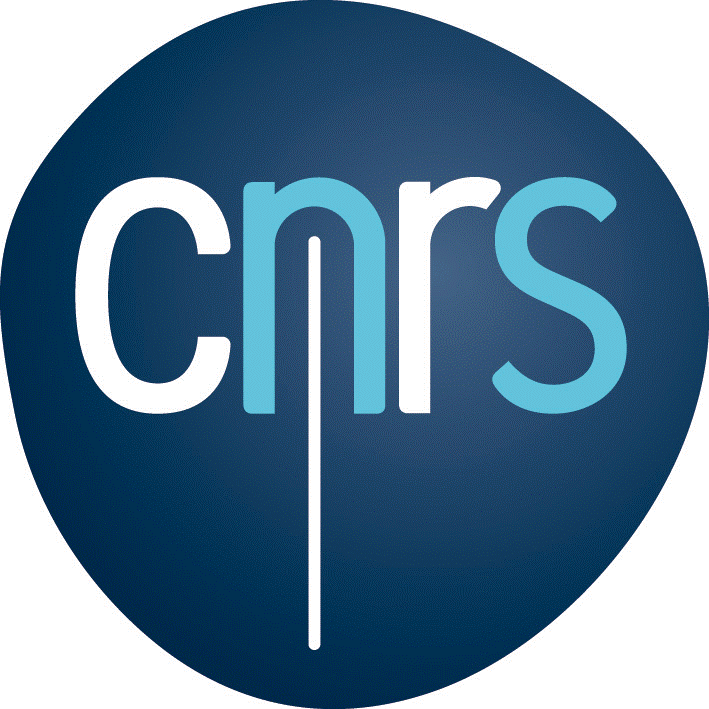ESWC is the premier European-based annual conference for researchers and practitioners in the field of semantic technologies. ESWC is the ideal venue for the discussion of the latest scientific insights and novel applications of semantic technologies.
The leading motto of the 10th edition of ESWC will be "Semantics and Big Data". A crucial challenge that will guide the efforts of many scientific communities in the years to come is the one of making sense of large volumes of heterogeneous and complex data. Application-relevant data often has to be processed in real time and originates from diverse sources such as Linked Data, text and speech, images, videos and sensors, communities and social networks, etc. ESWC, with its focus on semantics, can offer an important contribution to global challenge.
ESWC 2013 will feature nine thematic research tracks (see below) as well as an in-use and industrial track. In line with the motto "Semantics and Big Data", the conference will feature a special track on "Semantic Technologies for Big Data Analytics in Real Time". In order to foster the interaction with other disciplines, this year's edition will also feature a special track on "Cognition and Semantic Web".
For the research and special tracks, we welcome the submission of papers describing theoretical, analytical, methodological, empirical, and application research on semantic technologies. For the In-Use and Industrial track we solicit the submission of papers describing the practical exploitation of semantic technologies in different domains and sectors. Submitted papers should describe original work, present significant results, and provide rigorous, principled, and repeatable evaluation. We strongly encourage and appreciate the submission of papers including links to data sets and other material used for the evaluation as well as to live demos or source code for tool implementations.
Submitted papers will be judged based on originality, awareness of related work, potential impact on the Semantic Web field, technical soundness of the proposed methods, and readability. Each paper will be reviewed by at least three program committee members in addition to one track chair. This year a rebuttal phase has been introduced in order to give authors the opportunity to provide feedback to reviewers' questions. The authors' answers will support reviewers and track chairs in their discussion and in taking final decisions regarding acceptance.
Important Dates (11:59pm Hawaii Time)
-
Abstract submission: December 5th, 2012
-
-
Full paper submission: December 12th, 2012
-
-
Authors' rebuttals: February 11th-12th, 2013
-
-
Acceptance Notification: February 22nd, 2013
-
-
Camera ready: March 9th, 2013
-
-
Conference: May 26th-30th, 2013
Submission Information
Abstract submission is a strict requirement. All papers and abstracts have to be submitted via the conference submission page.
Each submitted paper must be associated with one of the available tracks.
Papers will be published by Springer in the Lecture Notes in Computer Science (LNCS) series. Papers must be in English, should not exceed fifteen (15) pages in length and must be formatted according to the LNCS guidelines. More information about the Springer's Lecture Notes in Computer Science (LNCS) are available on the Springer LNCS Web site. Papers must be submitted in PDF (Adobe's Portable Document Format) format and will not be accepted in any other format. Papers that exceed 15 pages or do not follow the LNCS guidelines can be rejected automatically without a review.
Authors of accepted papers will be required to provide semantic annotations for the abstract of their submission at the time of acceptance. At least one author of each accepted paper must register for the conference and present the paper there. ESWC conference proceedings will be published in Springer's Lecture Notes in Computer Science series, and distributed in electronic form during the conference.
All tracks and associated chairs are listed below. Additional information, track descriptions, and list of topics of interest can be found on the
conference web site.
Call for Papers 10th ESWC Tracks
Program Chairs
Valentina Presutti (STLab, ISTC-CNR, IT)
Oscar Corcho (UPM, ES)
Chairs
Aldo Gangemi (LIPN-Paris 13-Sorbonne Cité, FR and STLab ISTC-CNR, IT)
Eva Blomqvist (Linköping University, SE)
Chairs
Pascal Hitzler (Wright State University Dayton, Ohio-USA)
Luciano Serafini (FBK, Trento, IT)
Chairs
Jun Zhao (University of Oxford, UK)
Jens Lehmann (University of Leipzig, DE)
Chairs
María Esther Vidal (Universidad Simón Bolivar, Venezuela)
Axel Polleres (Siemens AG Österreich, AT)
Chairs
Marta Sabou (MODUL University Vienna, AT)
Andreas Hotho (University of Würzburg, DE)
Chairs
Alfio Gliozzo (IBM Watson Research Center, USA)
Malvina Nissim (University of Bologna, IT)
Chairs
Claudia d'Amato (University of Bari, IT)
Dunja Mladenic (J. Stefan Institute Ljubljana, SI)
Chairs
Josiane Parreira (DERI, IR)
Payam Barnaghi (University of Surrey, UK)
Chairs
Terry Payne (University of Liverpool, UK)
José Luis Ambite (University of Southern California, US)
Chairs
Sofia Angeletou (BBC, UK)
José Manuel Gómez-Pérez (iSOCO, ES)
ESWC 2013 Special Tracks
Chair
Sören Auer (University of Leipzig, DE)
Peter Boncz (Vrije Universiteit Amsterdam, NL)
Chairs
Krzysztof Janowicz (University of California, USA)
Kai-Uwe Kuehnberger (University of Osnabrück, DE)
Research Track: Ontologies
Ontologies and related artifacts (schemas, vocabularies), at various degrees of formalization and with heterogeneous representation and definition, are at the core of information systems design and knowledge representation, at least since the sixties. In the Semantic Web, they play a central role, enabling the design of robust applications in controlled environments needing intensive reasoning and intelligence, as well as enabling shallow querying and reasoning in large-scale linked data. The Semantic Web has also established empirical perspectives on ontologies, e.g. ontologies can be learnt from text, extracted from legacy data structures and the Web, and can be studied experimentally with experts and users, and against realistic tasks, making design patterns for ontologies emerge out of good practices. Finally, the management and dynamics of ontologies are addressed by matching, versioning, evolution, and other ontology engineering methods.
This track intends to present any innovative top-down or bottom-up research on ontologies (and related data) for the Semantic Web, Web3.0, Linked Data, and semantic technologies in general. Empirical research papers will be preferred, and the track is open to new evaluation methods, benchmarks, and gold standards that address specifically the task of evaluating ontologies and related data. The range of topics of interest includes, but is not limited to, the following:
-
Languages, tools, and methodologies for ontology engineering
-
Ontology extraction/induction from data and the Web
-
Ontology matching, alignment and merging
-
Ontology evolution
-
Collaborative ontology engineering
-
Design patterns for ontologies
-
Knowledge patterns
-
Ontology/pattern repositories and ontology search/reuse
-
Ontology-based data integration
-
Knowledge acquisition
-
Ontology management and maintenance
-
Ontology versioning
-
Ontology quality and evaluation
-
Ontologies for specific domains/applications
-
Ontology-based information retrieval and knowledge extraction
-
Ontologies for semantic technologies
Research Track: Reasoning
The Reasoning track invites submissions on all topics related to reasoning with ontologies and rules, to reasoning for the World Wide Web, to reasoning using Semantic Web technologies, reasoning and learning, and reasoning on highly dynamic and noisy data streams. Contributions can range from theoretical advances to usage-driven developments. Particularly encouraged are future-oriented contributions concerning topics such as stream reasoning, reasoning on the Web of Data, reasoning in presence of noisy data, and the application-driven development of reasoning methods. We also welcome paper with a strong relation to other tracks, but a clear focus on reasoning. The range of topics of interest includes, but is not limited to, the following
-
Approximate reasoning techniques
-
Scalable reasoning
-
Reasoning with inconsistency
-
Reasoning under uncertainty
-
Reasoning with large, expressive or distributed ontologies
-
Commonsense Reasoning
-
Non-deductive approaches to reasoning
-
Reasoning on the Web of Data
-
Declarative rule-based reasoning techniques
-
Mixing logical and statistical reasoning
-
Combining learning and reasoning
-
Reasoning with context dependent knowledge
-
Rule languages, standards, and rule systems
-
RDF- and OWL-based reasoning
-
Distributed and parallel reasoning
-
Implementation and evaluation of reasoners
-
Applications of reasoning
-
Stream reasoning
Research Track: Semantic Data Management
The Linking Open Data initiative has been successful in providing access to a large number of diverse datasets, along with a rapid growth of published data and links during the last few years. Billions of triples from Life and Health science groups, Government agencies, Wikipedia, entertainment organizations, and sensor data, currently comprise the Web of Data. Apart from that, RDF and Linked Data are becoming established within enterprise contexts where Semantic technologies are becoming mainstream to integrate huge amounts of enterprise data. To be able to scale up to existing linked datasets, efficient, effective and adaptive Semantic Data Management techniques need to be developed. Semantic Data Management techniques rely on the meaning of the data, for storing, managing, integrating and querying the Web of Data. The Semantic Data Management Track aims at bringing together researchers from the database, artificial intelligence and semantic web areas, to discuss research issues and experiences in developing, deploying and evaluating concepts, techniques and applications that address issues related to the management of Semantic Data. We encourage authors to submit papers on the following topics:
-
Systems for Semantic Data Management
-
Scalable Analysis of the Web of Data
-
Query processing of Semantic Data
-
Semantic access to Legacy Data
-
Management of spatial Data
-
Management of dynamic Data & temporal semantics
-
Virtualized Semantic Stores
-
Exploratory Semantic Searching and Browsing
-
Security and privacy
-
Traceability and trustworthiness
-
Ranking Semantic Data
-
Provenance in the Integration of Heterogeneous Semantic Data
-
Performance and Evaluation of Semantic Data Management
-
Techniques
-
Benchmarking
-
Semantic data management technologies for Big Data (volume, velocity, variety)
-
Semantic Data Management technologies for eGovernment,
-
eEnvironment, eMobility, eHealth, and within the enterprise.
Research Track: Linked Open Data
Linked Open Data, as a best practice of promoting the sharing and publication of structured data on the semantic Web, has gained significant momentum over the past years. As a newly emerged research area, there is much to be addressed from the extraction of Linked Data, visualization, query, storage, to the quality assessment, reasoning, and smart consumption. Existing research and technologies must be further exploited and adapted to empower a continuous and rapid advance in Linked Data movement. Therefore, our topics of interest include the following, but not limited to:
-
Linked Open Data publication
-
Managing the storage and publication of data, interlinks, and embedded LOD
-
Linked data and metadata integration/fusion/consolidation
-
Database, IR, NLP and AI technologies for LOD
-
Linked Open Data consumption
-
Linked data applications (e.g., eGovement, eEnvironment, or eHealth)
-
Searching, querying, analyzing, and mining linked data; reasoning with LOD
-
Dataset description and discovery
-
Visualization and user/social interactions for LOD
-
Architecture and infrastructure
-
Provenance, privacy, and rights management
-
Assessing data quality and data trustworthiness
-
Profiling of usage pattern or dynamics of LOD
-
Scalability in the linked data cloud.
Research Track: Social Web and Web Science
The tremendous increase in using Web technologies for establishing and maintaining diverse social interactions has transformed the Web into a socio-technological phenomenon. As a recognition of this status quo, the emerging Web Science discipline takes a multidisciplinary approach towards understanding Web phenomena with a special focus on the people and communities who shape the Web and whose lives are influenced by Web technologies emerging in an increasingly ubiquitous way. The Semantic Web plays an important role on this scene. On the one hand, it offers important technologies for making sense of and dealing with the large amount of user generated content that is inherently dynamic, heterogeneous and contextual. On the other hand, Semantic Web research can greatly benefit from user generated content for extending its information basis and improving its technologies, for example its reasoning mechanisms. For this track, we invite contributions that explore synergies between the Semantic Web and its technology on the one hand and social and ubiquitous Web phenomena on the other hand. Topics of interest address, among others, the following areas:
-
Bringing user generated content into the Semantic Web
-
Enriching social data and information with semantics and Linked Data
-
Semantically-enabled social platforms and applications: wikis, forums, portals, blogs and microblogs, etc.
-
Web users as virtual and physical sensors, crawlers, etc. for a ubiquitous social semantic web
-
Reasoning and personalization based on semantics: recommendations, social navigation, collaborative search, social filtering, etc
-
Social semantic Web, the Internet of Things and reality augmented by the social semantic web
-
Semantic and social network and community analysis
-
Semantics for Human-based computation and vice-versa
-
Querying, mining and analysis of social semantic data and dynamics
-
Representing and reasoning with uncertainty, provenance, trust in social Web data
-
Ethical issues related to the use of user generated content (e.g., privacy, consent, access control)
Research Track: Natural Language Processing and Information Retrieval
Automatic meaning-aware language processing provides an invaluable contribution to the development of semantic web technologies, so that any improvement in automatic tagging, text analysis and knowledge extraction from running text is beneficial to the semantic web in multiple ways. On the one hand it allows the automatic development of linked data from web content and corpora in general. On the other hand, because NLP heavily relies on accessible data and in particular to the availability of knowledge bases such as dictionaries and domain ontologies, user- or community-provided data tagging are definitively very useful in the development and improvement automatic language processing systems. Both NLP and Semantic Web also deal with the problem of connecting language to a sharable notion of meaning. For example, the problem of identity, which is at the basis of the process required to assign URIs, is the key issue of NLP tasks such as Entity and Event Co-reference. Finally, the most advanced web technologies such as Semantic Search, Question Answering, and Social Network Analysis benefit from the availability of large amounts of data and from the capability of language processing systems to use them. A notable example is IBM’s Watson, the Question Answering system that won the Jeopardy! Game last year, which suggests that looking at the interactions between NLP and Semantic Web is a very natural way to boost the performances of current semantic technology, and vice-versa.
The main goal of the track is to foster a closer interaction between the NLP and Semantic Web communities, which could lead to enhanced technologies in both fields and produce shared and better standards for knowledge representation, which are necessary for maximizing data exploitation, as well as to increase the amount of linked data by exploiting knowledge acquisition techniques, while generating industrial value in the semantic technologies area.
To this end, we solicit papers that describe interdisciplinary work where there is a clear interaction between Natural Language Processing and Semantic Web issues. Specific topics include, but are not limited to:
-
Semantic annotation and tagging exploiting linked data
-
Semantic search, semantic indexing and question answering
-
Standards for meaning representation
-
Ontology learning and ontology population
-
Ontology-based information extraction
-
Linking Natural Language Text to Open Data
-
Frame Induction from Text
-
Bootstrapping relations in knowledge bases.
-
Entity/event co-reference using linked data
-
Exploitation of lexical resources for the SW
-
Natural Language Search and Question Answering over linked data
-
Web-based creation of lexical resources
-
Language processing of social networks
Research Track: Mobile Web, Sensors and Semantic Streams
With the advent of the Semantic Web, Web Services, and social networks, the Web has become a global data sharing and processing platform. Social media and smart phones have also enabled “citizen sensing” - users reporting observations and events from the real world (e.g. via Twitter). In parallel with the developments on the Web, the Internet of Things (IoT), i.e., networks of sensors and actuators, has matured and has become a major scientific and economic driver, whose potential impact cannot be overestimated.
While the Web provides ease of use of distributed resources and a sophisticated development infrastructure, the IoT brings in real-time information from the physical world. A combination of these players will foster the development of even more sophisticated systems. However, most of this dynamic information currently available is not easy to access and process, and requires knowledge of the concrete deployments.
In this track we welcome new ideas and results that combine stream data - available on the Web or coming from sensors and/or mobile devices - and semantic technologies for effective data representation, interpretation, integration, and development of novel applications. We invite high-quality submissions related to (but not limited to) one or more of the following topics:
-
Architectures and middleware for the semantic streams
-
Context- and location-aware applications based on semantic technologies
-
Data management solutions for semantic streams
-
Intelligent data processing and large sensor and mobile web data analytics
-
Real-time data and resource discovery and quality-aware information search and retrieval
-
Linked data and mashups applied to stream data
-
Ontologies and rules for streams
-
Provenance of semantic data on the sensor and mobile web
-
Scalability and performance of semantic technologies on sensor and mobile web
-
Semantic-based security, privacy and trust in mobile devices and applications
Research Track: Machine Learning
With the growing availability of Semantic Web Data, machine learning approaches ---in particular inductive learning methods--- are increasing in relevance. The prospect is that innovative approaches for (semi-) automatically building and enriching ontologies from information sources such as Linked Data, tagged data, social networks, and ontologies will increasingly support Semantic Web applications. Furthermore, inductive incremental learning techniques can perform reasoning at large scale beyond the limitations of deductive approaches. Finally, machine learning can deal with the intrinsic uncertainty in Web data containing incomplete and/or contradictory information. We invite high quality contributions from all areas of research that address the emerging data challenges. Topic of interest include but are not limited to the following:
-
Extraction and augmentation of ontological knowledge from (linked) data using statistical and inductive methods
-
Statistical machine learning in Linked Data
-
Inductive methods for ontology construction
-
Machine learning for ontology matching, instance matching, search and retrieval
-
Link prediction and recommendation engines
-
Machine learning method for handling uncertain knowledge
-
Approximate inductive reasoning on ontologies
-
Semi-supervised and unbalanced learning for approximate concept retrieval, query answering
-
Data mining and knowledge discovery in Linked data and ontologies
-
OWA vs. CWA in learning
-
Evaluation of machine learning methods in the SW context
-
Ontology mining (concept change and novelty detection for ontology evolution, inductive aggregation etc.)
-
Inductive Logic Programming approaches
-
Deep learning for ontology learning and ontology refinement
-
Machine learning methods for Semantic Web mining (social network analysis, link prediction, ranking methods, kernels for the Semantic Web and for and Linked Data, etc. )
-
Instance-based learning for structured representations
-
Relational learning and Markov logic
-
Machine learning applications
Research Track: Services, Processes and Cloud Computing
The use of service-oriented technologies for business process management and the offering of IT services (IaaS, PaaS, SaaS) by providers of public, private or federated clouds for scalable business applications in the Internet of Services is gaining momentum within industry and academia alike. Web APIs, linked data and linked services on the Web become increasingly available for numerous application domains. This track is concerned with latest advances in semantic technologies that are suitable to address the challenges and opportunities raised. Topics of interest include (but are not limited to):
-
Semantic description of services and processes
-
Linked data services coordination and tools
-
Trusted, privacy preserving and secure semantic cloud services and processes
-
Semantic service discovery, selection and composition
-
Semantic service interoperability
-
Automated and interactive semantic modeling and composition
-
The use of semantics in run-time and offline service coordination
-
Semantics for ad-hoc data, service and process mashups
-
Semantics for service negotiation
-
Scalable automation of the service life cycle
-
Case studies of semantic business service applications, particularly in cloud, mobile, health, social, and other emerging areas.
In-Use & Industrial Track
Semantic Web technologies are making it to the society in a myriad different ways. In some cases, technology uptake loyally resembles the original vision of the researchers pioneering this research field. However, more and more frequently semantic technologies are being adopted in unanticipated ways, shaped by the actual needs of the market and its players, who appreciate the value added by these technologies and seek to gain some competitive advantage through selective adoption.
The Semantic Web in Use and Industry track provides a common ground for both researchers and industry, taking the outcome of their research in the Semantic Web area to the market and adopting Semantic Web technologies in specific businesses, respectively. Submissions to the Semantic Web in Use and Industry track will provide a deeper insight on the exploitation of Semantic Web technologies in different economic sectors. Papers will be therefore evaluated on the basis of the impact of semantic technologies in the market and the society and how it addresses real-life problems. A strong evaluation of the systems and methods discussed proving evidence of such impact is therefore required.
Topics of interests include but are not limited to the following:
-
Best practices and lessons learnt for the Semantic Web and Linked Data
-
Industry and Business Trends
-
Business Intelligence and Analytics
-
Cloud Computing
-
Corporate Data and Knowledge Management
-
Collaborative Content Management Systems, incl. Wikis
-
Sensor Networks
-
Smart Cities
-
Personal Information Management
-
Sentiment Analysis and Social Networks
-
Customer Relationship Management (CRM)
-
Open Government
-
eHealth and Life Sciences
-
Multimedia search
-
Security and Privacy
-
Information exchange standards
-
User Interfaces
-
Digital Libraries and Cultural Heritage
-
Media and Entertainment
-
Mobile applications
Special Track: Semantic Web for Big Data Analytics in Real Time
Our society and economy is at the verge of an era where dealing with large amounts of structured data plays an increasingly important role. Such data can be obtained from climate, pollution or traffic sensors in a city, it can comprise customer demand of an online travel agency or crowd-sourced spatial data such as collected by the OpenStreetMaps community. Integrating, analysing and using such data can result in completely new insights, applications as well as products and services. For example, we will be able to re-route traffic, if we detect traffic patterns causing increased air pollution in certain weather conditions. Travel companies can suggest background information on events, historic sights or attractions for certain travel destinations. Governments and public administrations can come closer to citizens and leverage their creative potential by opening up governmental data. In this track we aim to explore the scientific and technological challenges and innovative approaches for managing big data and large amounts of small data.
The range of topics of interest includes, but is not limited to:
-
Management of big data and large amounts of small data
-
Real-time and high-performance stream data processing
-
Crowdsourcing approaches for big data
-
Large-scale dataset analytics
-
Business intelligence involving big and open data
-
Visualization, browsing and exploration
-
Provenance tracing and data quality assessment
-
Large-scale syndication and replication
-
Appraisal, archiving and preservation
-
Big (meta-)data cataloging
-
Application of existing algorithms and approaches to big data (e.g. NLP, machine learning, data integration)
-
Data mining and sentiment analysis
-
Application scenarios of big data: enterprise data, smarter cities, governmental data, scientific data, climate, earth observation, bio-diversity
Special Track: Cognition and Semantic Web
During the early years Semantic Web research focused on the vision of a Web composed of machine readable and understandable data and, thus, on formal knowledge representation languages and reasoning services that support ontology engineering. Similarly to the trend observed for the classical Web some years ago, the attention is recently changing towards a more user-centric vision of the Semantic Web. Essentially, data stored on the Web is from and for humans. Therefore, cognitive aspects emerge as an essential ingredient for future work on knowledge acquisition, representation, retrieval, integration, and interaction. This track focuses on interdisciplinary approaches towards cognitively plausible methods, mechanisms, principles, and constraints that influence (or are influenced by) the Semantic Web of the future. In particular, this track invites contribution that relate cognitively inspired approaches to classical challenges of the Semantic Web. In this context, we are not only interested in the influence of cognitive science on the Semantic Web, but also, reversely, the potential influence of the Semantic Web for cognitive science research. Furthermore, we also invite research and applications from those areas of science that would mostly benefit from a tighter integration of cognitive science methods with semantic technologies, e.g, the digital humanities, geographic information science, bioinformatics, and so forth.
Topics of interests include but are not limited to the following:
-
Analogy and analogical learning
-
Semantic similarity
-
Theories of categorization, e.g., prototypes
-
Exploratory search and information seeking in Linked Data
-
Dialog systems
-
Approximate reasoning
-
Semantic heterogeneity and context
-
Cognitive constraints
-
Symbol grounding
-
Semantic interoperability
-
Cultural aspects of categorization
-
Emerging semantics
-
Change and ontology evolution
-
Knowledge Patterns and pattern recognition
-
New user interaction paradigms and interfaces
-
Common-sense reasoning
-
Personalization
-
Inductive and Abductive Reasoning
-
Semantic translation, mapping, and alignment
-
Spatial cognition
-
Conceptual spaces
-
Human competencies on the Semantic Web
-
Heuristics based on human knowledge representation
-
Cognitive strategies for interfaces and reasoners
-
Consequences of task-switching, priming, and stopping-rules


































